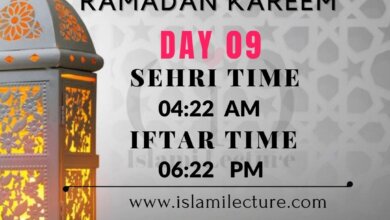How To Ask Dua in Ramadan

I wanted to continue inshallah in Dua, how to get closer to Allah سُبْحَانَهُ وَتَعَالَىٰ in our dua’s. By the end of the month, really will have some of the adab. Some of the mannerisms in the Dua and the one that I’m going to talk about tonight is one of the most potent ways to have your Dua. Increased in quality and beauty but it’s also one of the most dangerous concepts if not applied appropriately. That is the concept of “Al Inkisar” to be broken in front of Allah سُبْحَانَهُ وَتَعَالَىٰ to show your poverty, to show your vulnerability and to speak of it in the capacity of your Dua.
It’s actually pretty dangerous if you do it wrong but it is very powerful if you do it right. I want to give you an analogy actually that I was thinking about. As we went into ayatul sajda, in Surah Al Furqan:
وَالَّذِيۡنَ يَبِيۡتُوۡنَ لِرَبِّهِمۡ سُجَّدًا وَّقِيَامًا
who spend the night prostrating themselves before their Lord and standing;
(25:64)
Allah emphasizing people that spend their nights in prostration in sujud. And Allah سُبْحَانَهُ وَتَعَالَىٰ condemning those that don’t make sujud to Ar Rahman.
So I want to give you an example here, if your Dua could be drawn out, what does a Dua look like in your sajda. Physically speaking right, you have the image in your mind. When you physically humble yourself to Allah سُبْحَانَهُ وَتَعَالَىٰ your face is on the ground and, you’re saying Subhaana rabbiyal a’alaa’ means Glory be to Allah My Lord, the Most High. in prostration for Allah Ta’ala who is the highest and most supreme. What would your Dua look like if it had a physical image to it? How do you make your Dua like a sajda? So just talked about how to extol the names and attributes of Allah سُبْحَانَهُ وَتَعَالَىٰ. You’re glorifying Allah سُبْحَانَهُ وَتَعَالَىٰ and you want to humble yourself. You want to lower yourself to Allah سُبْحَانَهُ وَتَعَالَىٰ and we find this in many places in the Quran in very beautiful ways.
فَسَقَىٰ لَهُمَا ثُمَّ تَوَلَّىٰٓ إِلَى ٱلظِّلِّ فَقَالَ رَبِّ إِنِّى لِمَآ أَنزَلْتَ إِلَىَّ مِنْ خَيْرٍۢ فَقِيرٌۭ ٢٤
So he watered ˹their herd˺ for them, then withdrew to the shade and prayed, “My Lord! I am truly in ˹desperate˺ need of whatever provision You may have in store for me.”
Musa (AS:) says, he is completely desperate, oh Allah I am in need of whatever good you are going to send to me I am completely in need of that. So extolling Allah’s greatness. Zakariya (AS) and Ayub (AS)
قَالَ رَبِّ إِنِّى وَهَنَ ٱلْعَظْمُ مِنِّى وَٱشْتَعَلَ ٱلرَّأْسُ شَيْبًۭا وَلَمْ أَكُنۢ بِدُعَآئِكَ رَبِّ شَقِيًّۭا “My Lord! Surely my bones have become brittle, and grey hair has spread across my head, but I have never been disappointed in my prayer to You, my Lord! [19:4]
Ya Allah my bones have withered on the inside, my hair has burst with gray. Meaning, I am weak on the outside, I am weak on the inside. The age shows to everyone and what I feel on the inside, so weak on the inside, weak on the outside. When calls out to Allah سُبْحَانَهُ وَتَعَالَىٰ that, oh Allah I have been struck by
hardship and you are the most merciful of those who show mercy. So all he did literally was a name of Allah سُبْحَانَهُ وَتَعَالَىٰ attribute name of Allah and to show his weakness to Allah سُبْحَانَهُ وَتَعَالَىٰ.
There’s so many things that we have to take into consideration when doing this right though.
Number one, make sure that you mention the blessings of Allah upon you before you mention the hardship that you are in. If you’re going to mention the hardship that you are into to Allah سُبْحَانَهُ وَتَعَالَىٰ make sure you first mention the blessings that you have. In your Dua don’t go straight to the hardship instead start with the blessings. The things that you’re grateful for. Because that’s part of the Hamd, that’s part of the Thana, right. That’s part part of the praising Allah سُبْحَانَهُ وَتَعَالَىٰ. So praise and thank Allah سُبْحَانَهُ وَتَعَالَىٰ for the blessings that you do have. And then you go into the part where you talk about your weakness.
Number two, the scholars say don’t attribute the hardship to Allah سُبْحَانَهُ وَتَعَالَىٰ, right? All good is in the hands of Allah سُبْحَانَهُ وَتَعَالَىٰ and we don’t attribute hardship and evil to you. So don’t say oh Allah you did this to me, or don’t even insinuate that that you put me in this bad situation. Attribute the good to Allah. Don’t attribute the hardship to Allah سُبْحَانَهُ وَتَعَالَىٰ because that would be bad mannerisms in Dua. Also mention when it comes to the blessings of Allah سُبْحَانَهُ وَتَعَالَىٰ, speak of the blessings of Allah. Someone asks you, how you’re doing? You say Alhamdulillah. You know here, we’re in good health, we’re in good spirits, Alhamdulillah. Everything is going well Alhamdulillah. Extol the blessings of Allah upon you. Show that gratitude, spread the spirit of gratitude.
Look at us, we’re living in this situation, that situation I have nothing to complain about, right? So speak of the blessing of Allah سُبْحَانَهُ وَتَعَالَىٰ not in a boastful way in a grateful way. When it comes to your hardships and when it comes to complaining about your situation, I complain of my hardship and grief to Allah. So Yakub (AS) gives us that example
وَجَآءُو عَلَىٰ قَمِيصِهِۦ بِدَمٍۢ كَذِبٍۢ ۚ قَالَ بَلْ سَوَّلَتْ لَكُمْ أَنفُسُكُمْ أَمْرًۭا ۖ فَصَبْرٌۭ جَمِيلٌۭ ۖ وَٱللَّهُ ٱلْمُسْتَعَانُ عَلَىٰ مَا تَصِفُونَ
And they brought his shirt, stained with false blood. He responded, “No! Your souls must have tempted you to do something ˹evil˺. So ˹I can only endure with˺ beautiful patience! It is Allah’s help that I seek to bear your claims.”
[12:18]
He’s not complaining to his sons about it and says then I’m going to go make Dua for it too. He’s keeping it up and channeling it to Allah سُبْحَانَهُ وَتَعَالَىٰ.
Sometimes of course people need counseling, sometimes people need shura, that’s different. This is not what I’m talking about. I’m talking about complaining, as said when you complain to other people it’s like you’re complaining to the one who shows you no mercy about the one who shows you all Mercy.
Allah is the one who shows you mercy and so when you go complaining to people it’s like you’re complaining about the one who shows you Mercy to the one who shows you no mercy, right? No, keep the hardship and the circumstances. Look I’m going to take that to my Dua, it’s a part of my grieving process to Allah سُبْحَانَهُ وَتَعَالَىٰ. Turn to Allah سُبْحَانَهُ وَتَعَالَىٰ with that brokenness with that hurt, with that hardship, and when it comes to the blessing speak of the blessings of Allah سُبْحَانَهُ وَتَعَالَىٰ upon you and bring them into your Dua and don’t disparage yourself but mention your desperation.









